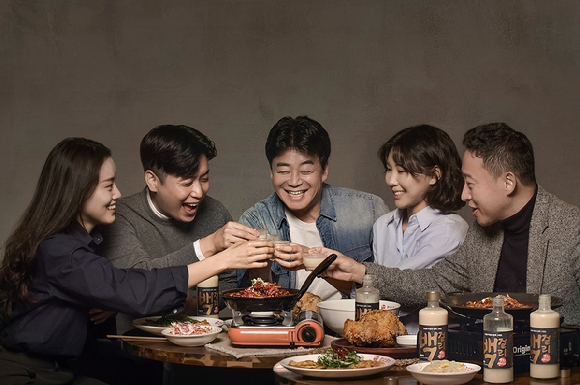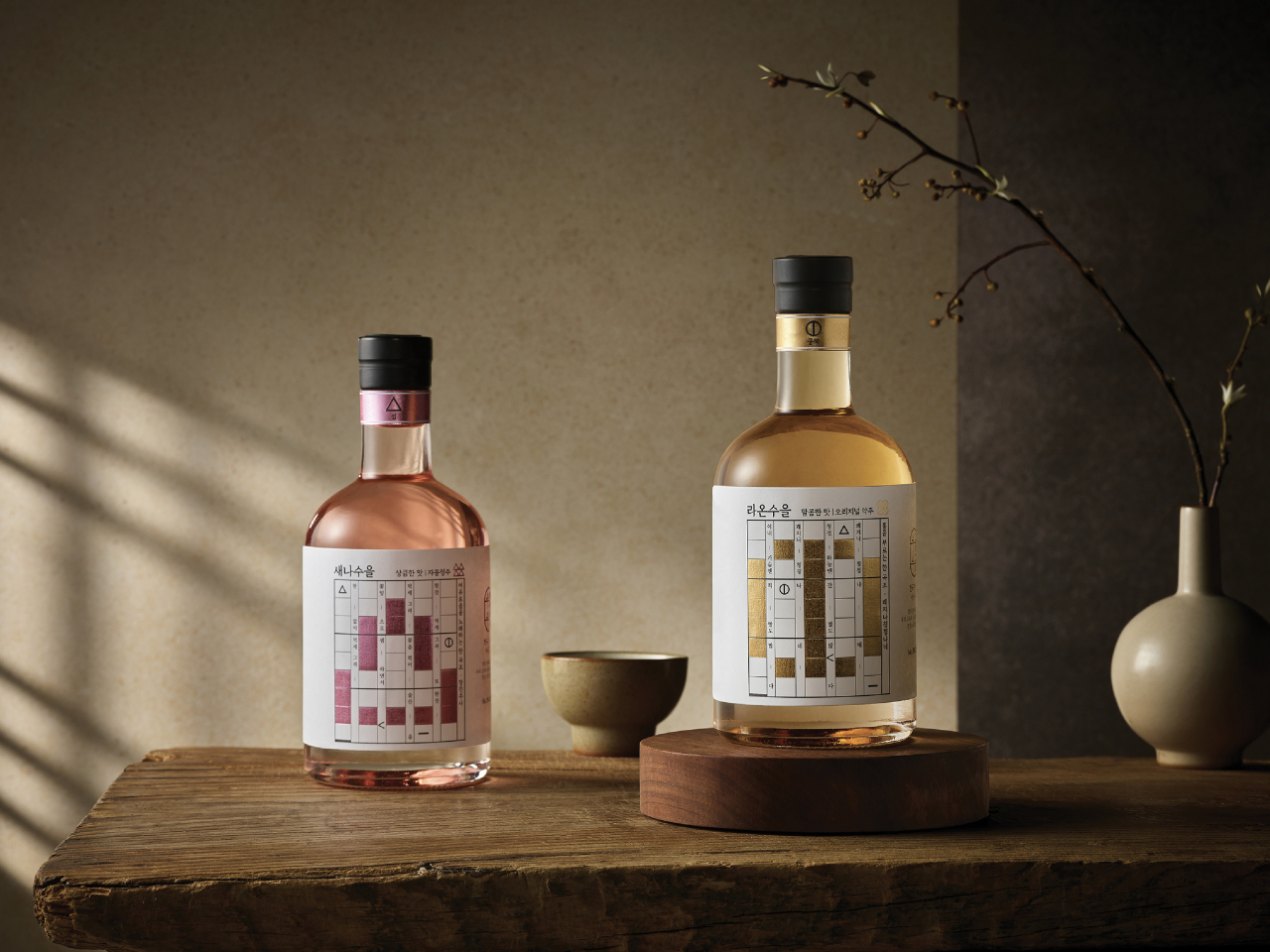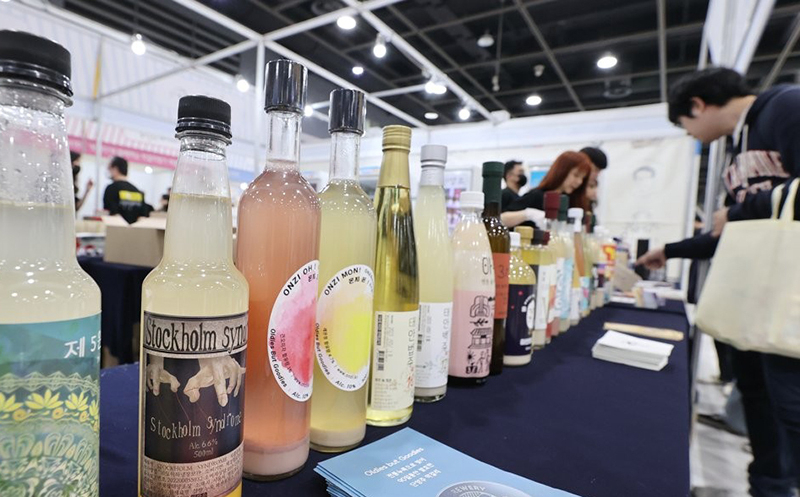Traditional liquors win hearts of millennials, Gen Z
Old liquor's newest renditions appeal to young sippers with new flavors and marketing approaches
By Jung Min-kyungPublished : Aug. 21, 2023 - 11:20

South Koreans are known for their unmatched love for alcohol, whether soju, beer, or both at the same time. But among younger drinkers, a different type of liquor is trending -- traditional Korean liquor.
"Makgeolli (unfiltered rice wine) and other traditional liquor used to have an outdated image," said Park Ja-hye, a 31-year-old office worker in Seoul.
"But now those liquors are sold in cans and bottles with modern and beautiful labels. They are now a popular gift," she added.
In a January survey conducted by e-commerce platform Homesool.com, involving 400 Koreans aged 20 to 39, 54.9 percent responded that they purchase traditional liquor for the purpose of gifting it. Other popular reasons were "because they liked drinking it with friends and families" and "because they enjoyed the taste."
The most popular traditional liquors in Korea are makgeolli, cheongju and various types of fruit wines. Cheongju is basically makgeolli brewed longer and filtered for a more refined taste.
Sales of Korea's traditional liquor products have more than doubled in the past five years.
The market grew from 40 billion won ($31.1 million) in sales in end-2017 to 94.2 billion won as of end-2021, according to the latest data by the government-affiliated Korea Agro-Fisheries & Food Trade Corp.
"Recently, Korea's traditional liquor market has gained momentum with stores selling more diverse kinds of makgeolli and more manufacturers rolling out trendy drinks," the aT report tied to the data said.
It also noted that young entrepreneurs in their 20s and 30s are injecting new dynamism into the market, leading the development of a more varied product range and the introduction of more intricate marketing approaches.
Overseas brews, trendy labels
Makku, launched in 2019, has captured its own corner of the market with some quite unusual traits for a makgeolli brand.
For starters, it is sold in a can with a trendy design, which makes it stand out from the pack with other makgeolli conventionally packaged in plastic bottles.

What’s more, this rendition of Korea’s oldest booze comes in three different flavors -- the original, mango and blueberry, again challenging the conventional perception that the rice wine does not pair well with non-native fruits.
"Makku is a brand born in New York, but its motive and inspiration stems from Korea," Carol Pak, founder and CEO of Sool, the company behind Makku, said last year at the drink's launch party in Seoul. Pak is second-generation Korean American.

Following its launch, Makku is now sold in most convenience stores across the country. The products sold in Korea is produced by a contracted manufacturer here.
It sold over 1 million cans in 22 states across the US as of end-2021 and entered the Canadian market in June.
"It's a Korean taste that was recognized by the world first before Korea and I hope it can start a trend in the drinking culture among Korean millennials and Gen Z," she added.
Conglomerates are also jumping into the traditional liquor competition.
Emart24, a convenience store chain under Korean retail giant Shinsegae, recently bagged a 2023 iF Design Award in the packaging category for its traditional liquor brand SoolSool.
SoolSool is a special type of a traditional drink called sogokju, which is made in Seocheon County in South Chungcheong Province. It is brewed from glutinous rice often used to make rice cake.
The award-winning label is a reinterpretation of "jeongganbo," a music notation system. Jeongganbo was created by King Sejong who reigned from 1418-1450 during the Joseon era.
SoolSool has four different flavors, each of them with a different identity: leisureliness, abundance, love and joy. Each label is paired with four different musical symbols – "shimpyo" (rest), "sumpyo" (breath mark), "butimpyo" (smoothly elongate), and "kung-jjak" (to hit both sides of the "janggu" drum).
CU, South Korea's top convenience store chain, rolled out Andong Soju Highball, a cocktail based on Andong Soju. Andong Soju is a traditional type of distilled soju produced in Korea's traditional town of Andong, North Gyeongsang Province. Like Makku, it is produced in cans with trendy designs to catch the eyes of consumers in their 20s and 30s.
Geared for young sippers
With a growing number of young consumers that prefer to buy groceries online, businesses are developing platforms that could cater to their needs.
The January survey by Homesool.com showed the majority of consumers in their 20s and 30s prefer to purchase traditional liquors online.
Almost 55 percent of the 400 respondents said they tend to purchase the products online, which increased by 8.4 percentage point on-year.
At the forefront of the trend is Sooldamhwa, a startup launched in 2018 that provides monthly Korean traditional liquor subscription services via an app of same name for users.
With a monthly payment of 39,000 won, subscribers can receive a box of two to four bottles of traditional liquor every four weeks. The company carefully selects three of 2,030 traditional liquor manufactured in 1,234 local breweries every time.
The service has some 13,000 subscribers, 70 percent of which are millennial and Gen Z users, or those born between 1980 and early 2000s, according to its spokesperson.
"Millennials and Gen Z tend to value personal happiness, but the Korean drinking culture continues to focus on the convenience of the group," a Sooldamhwa spokesperson said in an interview.
"Traditional Korean liquor is cheaper than whiskey, but no longer viewed as outdated by young Koreans due to the market's recent trendy update."
Paiksool.com, an online community site dedicated to sharing information on traditional Korean liquor has seen a surge in the number of members this year. The community is operated by Theborn Korea, founded and headed by celebrity chef Paik Jong-won.
The forum facilitates meetings and information sharing between traditional liquor aficionados.
The site has been receiving some 500 visitors daily since its launch in March last year.
"Most of our visitors and members are those in their 20s and 30s," a Paiksool.com official said.
"The growing interest in traditional liquor among millennials and Gen Z has led to the popularity of our site, which allows them access to various fun and communal experiences."




















